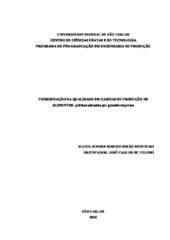Coordenação da qualidade em cadeias de produção de alimentos: análise de práticas adotadas por grandes empresas.
Abstract
In view of the demands established by the market for more adequacy to
consumer needs and against the challenging competitiveness worldwide, companies are
obliged to offer quality products with competitive prices. The products that arrive in the
consumer market are the results of a series of activities in the production and supply
chains. The coordination of such activities looks for, among other factors, to improve
the quality of products, by means of an improved information flow among the chain
links. Thus, this is one of the challenges found in the food production chains.
Since coordination is an important factor to assure the quality of a
productive chain, and because this is a relatively recent practice, the objective of the
present work is to identify the degree of quality coordination in the food production
chain, from the analyses of quality practices adopted by large companies in the segment
of milk and derivatives, derivates of meat, oil and fat, juice and biscuit , in the sense of
main raw-material suppliers and final distributors/consumers.
Case studies were chosen as the research method, using semi-structured
interview techniques as data collectors, by applying questionnaires in large-sized
companies of the food segment previously mentioned, in main raw-material suppliers,
as well as distributors and retail. An investigation concerning quality coordination was
performed in the chains where such companies are incorporated, thus identifying and
analyzing the adopted practices for this coordination As a result of the outcome,
recommendations were elaborated to improve the activities of quality coordination in
these chains.
In a general manner, it is observed that the applied quality practices in
retail by the processing companies are incipient, that is, the quality assurance activities
are carried out by the processing companies until the center of distribution, and from
the moment the products are shipped to retail, the responsibility for preserving quality
is transferred to them. A lack of more vigorous activities by the processing companies
was observed, in the sense of promoting formal auditing at the sales areas and also
more governmental control regulation regarding sanitary aspects in retail, in order to
guarantee preservation of the food products. Because refrigerated products are more
perishable, they require more quality control than those that are not refrigerated, and,
according to the research, these are the products that present more quality practices
from and to the chain, with a higher degree of quality coordination.
